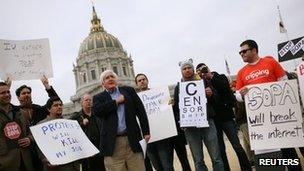Sopa and Pipa bills postponed in US Congress
- Published

Protesters say the passage of the anti-online piracy bills would threaten the openness of the internet
The US Congress has halted debate on two contested anti-online piracy bills.
Senate Majority Leader Harry Reid delayed a vote on the Protect IP Act (Pipa) scheduled for Tuesday.
House Judiciary Committee Chairman Lamar Smith then said the Stop Online Piracy Act (Sopa) until a compromise was reached.
The decisions follow protests by online encyclopaedia Wikipedia, and thousands of other websites, which went "dark" in protest for 24 hours earlier this week.
"In light of recent events, I have decided to postpone Tuesday's vote on the PROTECT IP Act," Senate Majority Leader Harry Reid, a Democrat, on Friday.
Mr Smith, a Texas Republican in the House of Representatives, said in a statement: "I have heard from the critics and I take seriously their concerns regarding proposed legislation to address the problem of online piracy.
"It is clear that we need to revisit the approach on how best to address the problem of foreign thieves that steal and sell American inventions and products."
'Censoring the web'
Of about 40 co-sponsors for the Pipa bill, a handful withdrew their support on Wednesday, as thousands of websites participated in a co-ordinated online protest.
Floods of emails and phone calls to congressmen followed the online protests, prompting some lawmakers to withdraw their support for the measures.
More than seven million people signed a petition on Google saying that passage of the legislation would result in censoring the web and impose a regulatory burden on businesses.
Both bills focus on responding to online piracy, specifically illegal copies of films and other media.
The bills would also outlaw sites from containing information about how to access blocked sites.
The Motion Picture Association of America, a key supporter of the legislation, has campaigned strongly against the violation of copyright laws.
But on Thursday evening their website was targeted by a hacking group known as Anonymous.
Celebrity backing
Anonymous also claimed credit for blocking access to the US Department of Justice and FBI websites, by launching a so-called "denial-of-service" attack that bombards their websites with traffic.
The move was being seen as a retaliation after the Department of Justice shut down a major file-sharing website, Megaupload.
The firm's co-founders have been charged with violating existing anti-piracy laws.
Four Megaupload employees were arrested in Auckland, New Zealand, at the request of US authorities.
Police seized cash, valuable cars and a short-barrelled shotgun from the residence of the website's German founder, Kim Dotcom, formerly known as Kim Schmitz.
Their Hong Kong-based site had around 150 million users and 50 million daily hits.
It has received celebrity endorsements from artists such as Alicia Keys and Kanye West, making it one of the internet's most high profile file-sharing platforms.
- Published8 March 2012
- Published18 January 2012
- Published8 March 2012
- Published8 March 2012
- Published20 January 2012
- Published19 January 2012